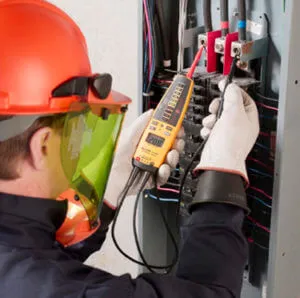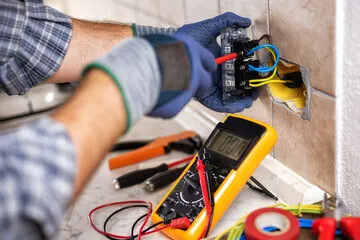Faculty, staff, and students need to have an awareness of electrical safety in order to support a safe learning and working environment.
If you observe something that you believe might be an electrical hazard contact:
Notifying SOS of any noticeable electrical hazards can protect others from a potential electric shock, fire or explosion.
Service Operations Support (SOS) is the center of communications and work control for Physical Plant. The SOS team reviews on-line Service Requests and helps route them to the appropriate maintenance personnel for scheduling and follow up.
Email sos@uvm.edu
Phone 802-656-2560
Informational Video
Important Information
Common Electrical Safety Issues
Body
- Do not block electrical panels. OSHA requires a 36-inch clearance in front of all electrical panels.
- Discard any piece of equipment that gives you even the slightest shock. If the resistance through your body is lowered (e.g. standing in water or touching metal), even the slightest shock can be deadly.
- Junction boxes and electrical panels need to have proper metal covers in place to conceal all wiring. Hard wiring should never be exposed or accessible to those who are not electricians.
Ground Fault Circuit Interrupters
Body
- Do not block electrical panels. OSHA requires a 36-inch clearance in front of all electrical panels.
- Discard any piece of equipment that gives you even the slightest shock. If the resistance through your body is lowered (e.g. standing in water or touching metal), even the slightest shock can be deadly.
- Junction boxes and electrical panels need to have proper metal covers in place to conceal all wiring. Hard wiring should never be exposed or accessible to those who are not electricians.
Extension Cords/Power Strips Extension
Body
- Cords should not be used in place of permanent wiring. If you plan to use an extension cord for an extended period of time, contact UVM Physical Plant Dept to install a permanent outlet.
- Discard unsafe extension cords. An unsafe cord is one where the outer insulation is cracked or broken. The grounding pin must also be fully intact.
- Only licensed electricians are authorized to replace plugs, or splice cords.
- Extension cords need to be protected from heavy pedestrian traffic to prevent slips, trips and falls.
- Power strips should not be permanently mounted to a wall or any other structure, even if the power strip has specific mounting fittings.
- Power strips or extension cords should not be connected to each other. Doing this can overload the circuit creating a potential fire hazard.
Forms and Checklists
Body
- Categories of Electrical Hazards (PDF)
- Job Briefing Checklist (PDF)
- Clear Working Space (PDF)
- Approach Boundaries (PDF)
- Contractor Communication (PDF)
- Training Matrix (PDF)
- Live Work Permit (PDF)
- Signs and Labeling (PDF)
- Employee Electrical Equipment Sign-Off Form (PDF)
- Workplace Safety Observation Form (PDF)
Standard Operating Procedures
Energy Saving Tips
Body
- Turn off unnecessary lighting and electronic equipment.
- Place large office copiers and laser printers in "energy-saving" mode after completing scan or print jobs, if available.
- Unplug all electrical devices not in use for an extended period of time; Many electronic devices have "phantom” or “ghost" power even after you turn off the switch
- Close laboratory fume hood sashes when hoods are not in use.
- In summer, pull shades and blinds closed to help reduce "heat gain" during hot daytime hours.
- For all window or portable air conditioning units, keep the fan on LOW and the temperature set point at 78 degrees; ALWAYS turn off before leaving for extended periods of time during the day and for home in the evenings and weekends


